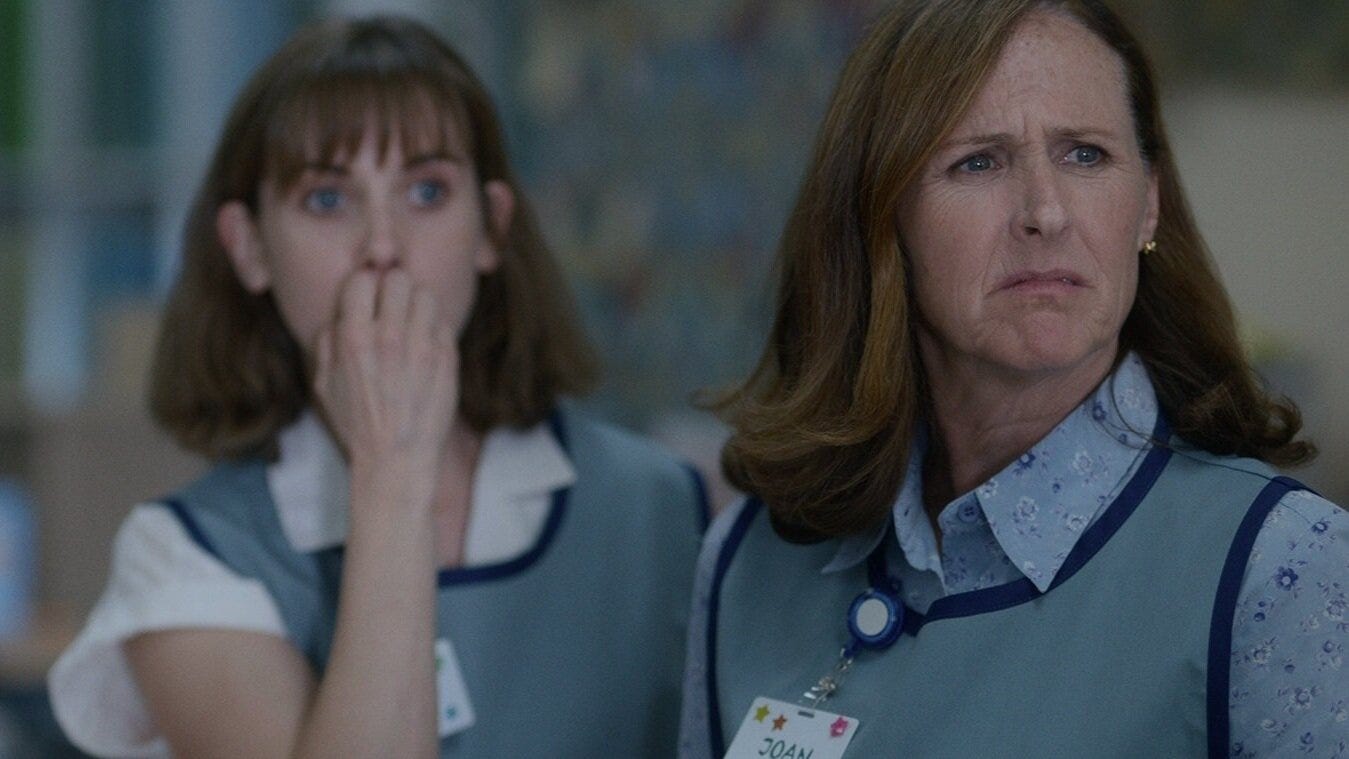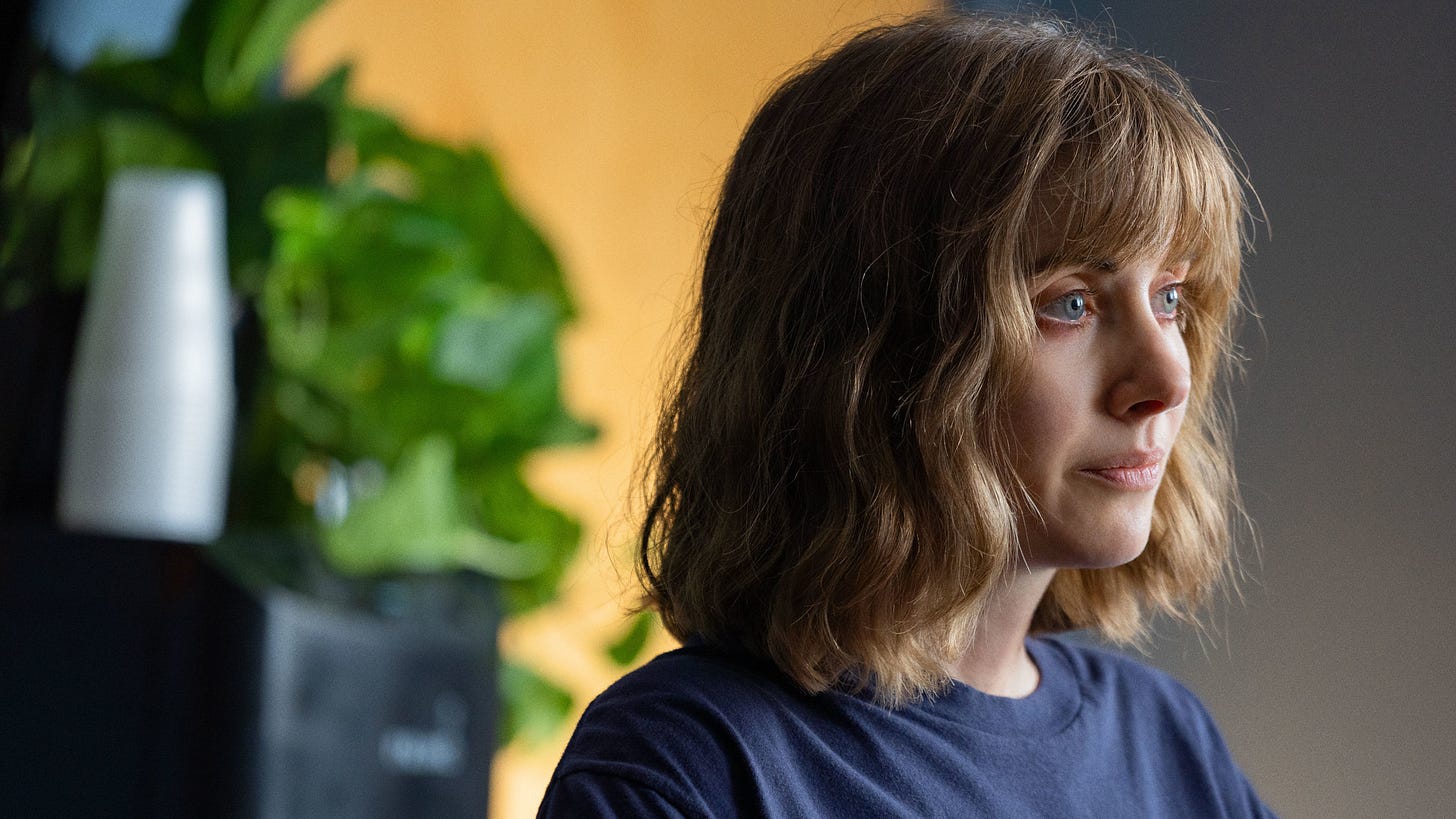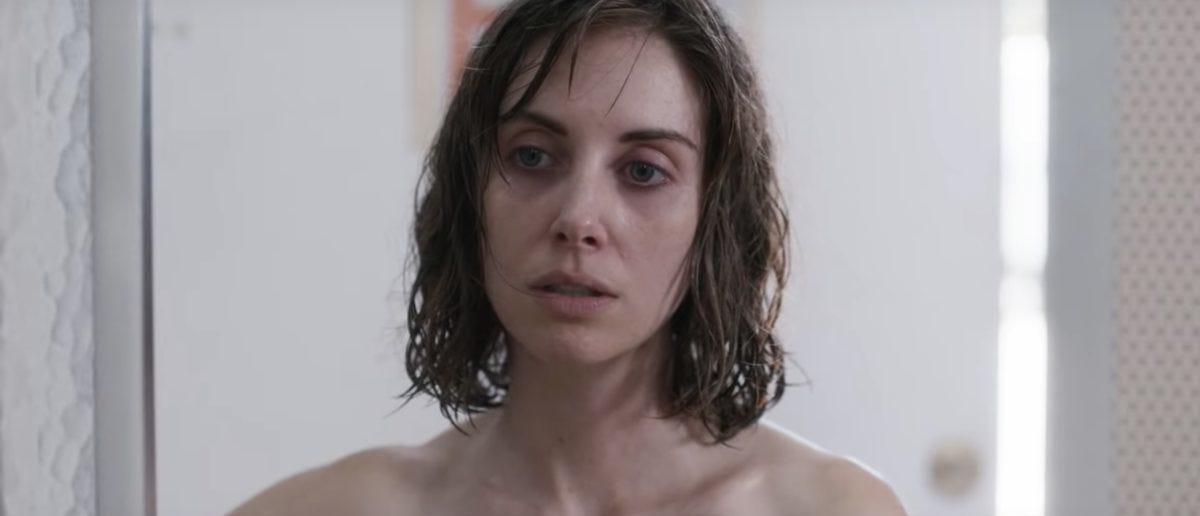Okay, I slipped up, what can I tell you? I spent years categorizing these movies while in prison, and I just assumed “Horse Girl” was a comedy. Sure, Allison Brie is a pretty straightforward “Funny Lady”, and in that regard this movie is a neat fit into this catalog. But “Horse Girl” is a decidedly downbeat film with nary a joke in sight. This is a “Horse Girl” of a different color.
Brie plays Sarah, a sweet and spacey girl who works at a craft shop. My first thought was that this girl has done time. She’s just a little too enthusiastic, she knows way more about the merchandise than anyone should, and she seems washed out, like an illustration left in the rain. Brie has always specialized in delightful, perky comedic characters, but here she’s definitely turned down a couple knobs lower than usual. This is a character who has experienced a type of pain most people will never even comprehend.
Very early on, director Jeff Baena establishes a tone that grants the viewer just enough information to speculate on what is wrong. Sarah appears at a horse stable to care for the animals within, only to be politely shooed away by the owners – as nice as Sarah is, she is not wanted. She is a pariah to some, we learn, and it’s not unlike some in prison – she is desperately trying to put a positive face on this, and yet the act of doing so manufactures a lack of self-awareness. This is all before sleepwalking and conspiracy theories, of course. We gradually learn that others have labeled Sarah as damaged for her past. We see how she tries to conjure up an explanation for this. And we ultimately recognize someone who is eager to devise coping mechanisms in the form of trumpeting the good news, as if she can somehow overshadow her problems.
Much of “Horse Girl” revolves around Sarah slowly realizing she should decipher her own vivid dreams before getting involved in what she feels is the necessary detective work. To the movie’s credit, the deeper the mystery goes, the thicker the ambiguity grows. We want Sarah, who seems unbalanced but otherwise sweet, to be safe and find happiness. But we’re also rooting against this universe that questions and doubts her. Baena (who has, indeed, been responsible for several comedies over the years, many of which I’ll review) skillfully doesn’t tip too far into either direction, contrasting our search for answers with our well wishes for Sarah, particularly as her mind begins to deteriorate. This is a somewhat fanciful film about mental illness, so perhaps someone more closely associated may feel differently. But I remained fascinated by the strands that Sarah attempts to pull. There is nothing easy about this movie.
Early on in my sentence, I ended up in a “Mental Health Ward”. I’m not sure how I got in there, I didn’t say I was suicidal or that I was having problems. But once you’re there, you’re only a distraction to the people watching over you. For nineteen days, I was placed in a solitary cell, the window covered up. The only elements present in this cell were a steel plank (to place a mattress, which they would not give to me), a sink/toilet combo (no toiletries whatsoever) and a cold, hard door, with no one on the other side. Three times a day, the slot opened and a meal was dropped in. I wore only a vest, and it felt like it had been picked off the floor of the driver’s side of a truck. No underwear, no socks or shoes.
On the first day, a voice boomed into my room. They told me I would not receive any meals until I unblocked the camera. I looked up – there was a camera on the wall about twelve feet above me, and somehow, someone had mashed a milk carton into the lens. I couldn’t begin to reach it. I was eventually allowed a meal, though I had to crumple up a second milk carton and repeatedly throw it at the camera to unblock it.
I could hear the men in the surrounding cells but I couldn’t see them. Many were often screaming at odd hours. I overheard an altercation once, officers called into a man’s cell. He screamed about being covered in roaches. I looked around me and realized I couldn’t tell whether he was hallucinating or actually telling the truth. The man in the cell next to me seemed to never sleep, rapping and singing at all hours, every and any song you could imagine. Sometimes he would give us “Hypnotize” by the Notorious B.I.G. And sometimes, it was EVERY WORD of Wang Chung’s “To Live And Die In L.A.”
Doctors passed by. I begged to get out, but all they wanted to do was prescribe pills. I begged, begged, for clothes, a mattress, a bath. I didn’t receive a shower for the first twelve days. An odd inarticulate memory was that I was cuffed up and taken to a shower at the end of the hall, which was just a massive open-air room that seemed to have one water nozzle despite being able to fit multiple people. I spoke to one officer who was trying to take me from one place to another, a heavyset younger man. I asked him why I was there, and if I’d get out soon. And while he answered me with confused uncertainty, he playfully balanced on one foot, like a baby with no body discipline, trying to learn how to shift his weight. It was more important for his restless, oblong body to shift from left to right with something trying to approach grace than it was for him to hear me talk. I’ll always remember that as a perfect encapsulation as to how prisons treat anyone they even casually think has a mental handicap.








I’m so sorry. I wish you could have at least found out why it even happened because I’m sure you would use that information to help others.
This seems like a very sad movie. I’m trying to process how you could’ve gone through something like that in prison, and actually be okay now. The system is so disgusting. It’s hard to understand.